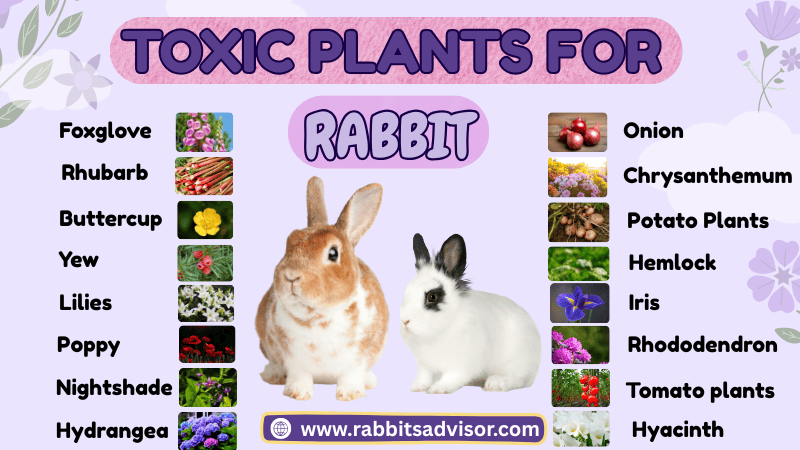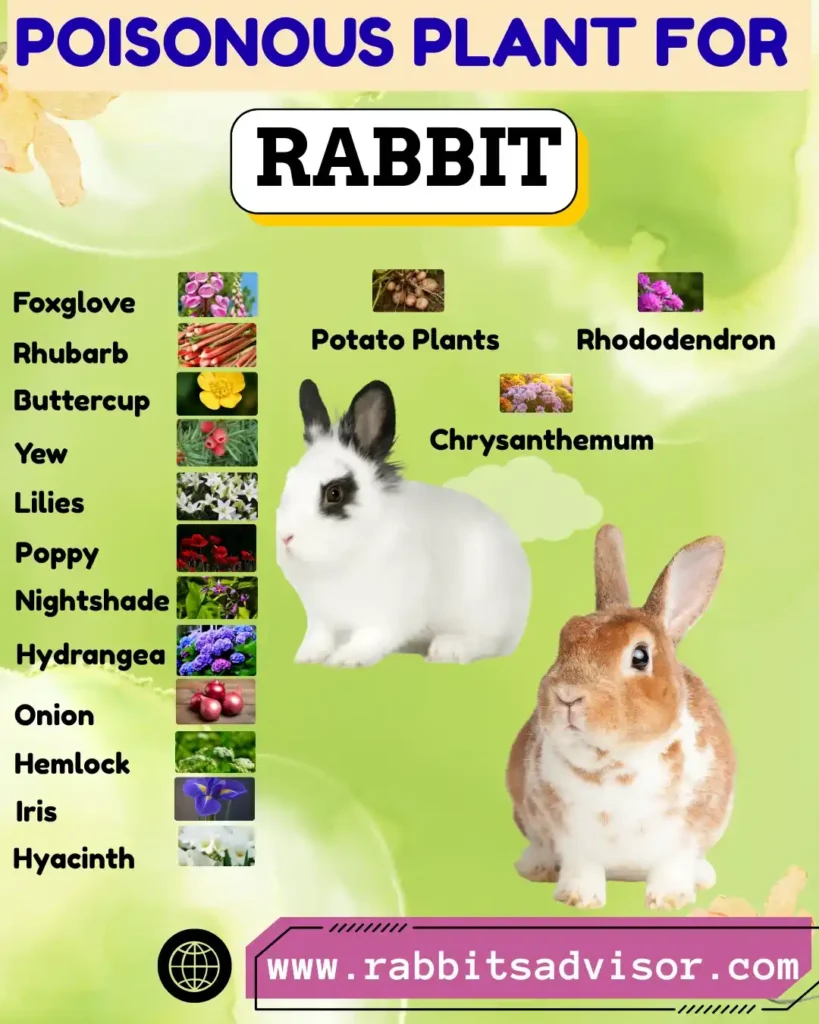As serious pet owner, you must be aware about all types of toxic plants for rabbits that can pose many health problems. This is because; rabbits can be poisoned by a variety of common plants.
Since rabbits frequently nibble on plants to explore their surroundings; so it’s critical to recognize those that could be dangerous. Many species whether they are garden or domestic plants can be detrimental.

One can avoid regrettable situations by becoming knowledgeable pet owner about rabbit toxicity. With this information, rabbit owners may make wise choices and give their animals a secure environment.
About Plants Rabbits Unable to Eat
As you know that he digestive system of rabbits is more sensitive. Do, they need a diet in low fat, sugar, and higher fiber. For this reason, mostly “people food” is not suitable for rabbits, like as bread, rice, chips, or chocolate.
Also Read: Can Rabbits Eat Melon (Rind + Seeds)? Safe or Harmful
So, always choose healthy rabbit snacks instead of chips or other nibbles when Thumper is snooping around for a treat.
What some plants are poisonous to rabbits, then? Although rabbits maintained as pets often have a fairly small diet, those that given free range or permitted to forage in their homes run the risk of consuming plants that are harmful to them.
Poisonous Plants for Rabbits with Pictures
Here, we will show you some toxic plants for rabbits that are harmful for them to eat. Let’s start one by one!
Foxglove
Foxglove plants are extremely poisonous to rabbits. Cardiac glycosides are in these plants that are harmful to the kidneys and heart. Avoid the entire plant as it is poisonous to rabbits. Foxglove plants can have detrimental effects on rabbits even in little doses.
Rhubarb
Rhubarb leaves also come in toxic food as eating too much. The high oxylic acid content of these leaves may be harmful to a rabbit’s health. Although, they are less likely to be harmful, but other plant parts can also irritate rabbits.

Oxylic acid is also present in other leafy greens that rabbits consume. But, these are safest stuff for your pet rabbit, cause of low level than rhubarb.
Buttercup
Rabbits can get receive poisonous by all buttercup species. This covers the stem, roots, leaves, and flower. Unless they are eaten in extremely high concentrations; but buttercup plants are generally not especially harmful to rabbits.
Also Read: Can Rabbits Eat Honey? Explore Facts and Myths
A rabbit’s mouth will probably become inflamed or have digestive issues. The fluid from buttercups with celery leaves is extremely poisonous to rabbits.
Yew
Yew berries and foliage are also extremely poisonous for eating rabbits. Even if the branches have been dried and removed from the tree for a few weeks, than you should not give them to your rabbit. In fact, this makes them more poisonous. Yew is extremely harmful and contains toxins that can kill rabbits suddenly.
Cannabis
While the flowers and stems of marijuana are dangerous and should be avoided; but leaves may be hazardous to rabbits. Due to its unclear health effects, the House Rabbit Society warns against giving cannabis leaves to rabbits.
There is currently no proof that marijuana leaves are hazardous to rabbits. Studies on other companion animals have shown that consuming the leaves and breathing in the smoke can have detrimental effects on their health.
Lilies
Different lily species are similarly harmful to rabbits to differing degrees. Lily and calla lily plants are extremely toxic and can result in serious gastrointestinal issues; other than kaffir lily roots are also poisonous.
For this reason, peace lilies should be out of rabbits’ reach. Avoid these plants including their flowers, leaves, and stems; especially the foliage of a lily of the valley bush are also poisonous to rabbits.
Poppy
Poppy plants are in higher opium alkaloids compounds that extremely to rabbit’s health. The seeds are especially lethal due to the high concentration of opium alkaloids. The entire plant also has other components that are toxic to rabbits. For a rabbit, even a dried poppy plant can be extremely toxic.
Nightshade
As researched out; nightshade plants have been employed as poisons and medicines. As compared to carnivores, they are typically less toxic to herbivores. These plants are nonetheless toxic to rabbits, even though they could be safe for them to consume in little amount.
This also contains woolly nightshade, crimson nightshade, bittersweet nightshade, black nightshade, and climbing nightshade. Although belladonna often known as deadly nightshade that can be toxic to rabbits.
Hydrangea
Rabbits can be also extremely poisoned by the leaves, buds, and flowers of hydrangea plants. Amygdalin named substance found in high concentrations in some plants that decomposes to produce cyanide.
Most mammals get poisonous by intake this chemical. Even a small amount of hydrangea might cause problems for rabbits, because they are much smaller than other mammals.
Onion
Rabbits cannot eat any of the plants in the onion family. This covers all types of normal onions as well as shallots, green onions, and even garlic. Always, keep in mind; this covers every component of an onion plant, including the leaves, roots, and flowers. Rabbits’ immune systems might be weakened and anemia cause of eating onions.
Chrysanthemum
In large enough quantities, the leaves and stems of the mum plants can be poisonous to your bunnies. Due to strong aroma and fuzzy texture of the blossoms, deer or wild rabbits are most likely to overlook when they are outside.
So, your rabbit decides to nibble on your chrysanthemums. For this reason, it’s still advisable to keep these plants out of their reach.
Potato Plants
Unripe potatoes and their leaves and stems are mildly toxic for bunnies. These are resembled to nightshade plants that contain solanine and alkaloid chemicals; so they are in come of toxic stuffs to rabbits. The greener portion of the plant typically contains higher concentrations of these chemicals.
Hemlock
Rabbits can be also poisoned by hemlock plants. They are among the most poisonous plant groupings for rabbits and can quickly result in death. Hemlock plants are poisonous in all sections and should not be fed to rabbits. Since hemlock is toxic to humans and many other animals. So, it is better to keep it out of everyone’s mouths.
Iris
Iris Yellow irises are extremely poisonous and must be avoided at all costs. This covers the leaves, bloom, roots, and stem of the yellow iris plant. However, some irises are not as poisonous. Other iris species’ plant juice might irritate certain people.
Rhododendron
Beautiful rhododendrons, such as azaleas, are extremely harmful to rabbits. This holds the all parts of this plant, like as stems, roots, leaves, and flowers. Rabbits may be poisoned even by honey produced from these blooms.
Although rhododendron plants are frequently avoided by wild rabbits, pet rabbits obviously don’t always have the best sense of what’s best for them. These plants are quite dangerous to rabbits. So, it’s best to consult your veterinarian even if your rabbit just consumes a small amount.
Tomato Plants
Many parts of tomato plants are poisonous to rabbits, and they are related to nightshade plants. Large amounts of solanines found in the leaves and stems that are toxic to rabbits. On the other hand, rabbits can be treated with tomato fruit because it is not poisonous.
Hyacinth
Another plant that is mildly toxic is hyacinth. It is another plant that has alkaloid components that might be harmful if ingested in excess. The entire plant has the potential to be toxic, including the stem, leaves, roots, and bloom. For this, rabbits should not be able to reach it.
Wolfsbane
Rabbits are poisoned by all wolfsbane and allied species. They contain alkaloids that can lead to serious heart issues and intestinal disturbances. Even a tiny quantity can also result in heart to slow down and eventually stop entirely.
Since the entire plant is poisonous, rabbits should not be allowed to touch it. The only silver lining is that this plant tends to taste awful, so a rabbit is unlikely to consume it.
Ivy
Rabbits are mildly poisoned by ivy. The berries and leaves of these plants have getting higher concentration of saponins.
Anemia can result from a rabbit’s red blood cells being destroyed by high amounts of this substance.
It’s interesting that these saponins are present in little amounts in a variety of rabbit-safe foods.
Other Unsafe Plants for Rabbits
Let’s get explore them! Just keep reading one by one.
Azaleas
Toxins found in azaleas can have an impact on rabbits’ neurological and gastrointestinal systems. Large consumption may pose major health issues, even fatal.
Oleander
Rabbits are also extremely poisoned by all components of the oleander (Nerium oleander) plant. Eating even tiny amounts can be lethal.
Also Read: Can Rabbits Eat Eggplant (Leaves + Skin + Raw)? Full Guide
Larkspur
Poisonous alkaloids are also in larkspur that can have potentially lethal effects on rabbits’ heart and brain systems.
Foxglove
Heart glycosides found in foxglove control rabbits’ heart rhythms. In extreme situations, this can be fatal.
Dieffenbachia
Dieffenbachia has crystals that can arise many gastrointestinal irritations. Along with, large amount eating can also lead to breathing problems and suffocation.
Snake Root
Snake root also consists toxins that can pose severe irritation to the mouth and throat.
List of Toxic Plants for Rabbits – Get More
- Acacia twigs and flowers
- Anemone
- Antirrhinum
- Apricot twigs and seed kernels
- Arum
- Azalea – twigs and all parts
- Beans – any type
- Beech twigs
- Big wort
- Bindweed
- Bluebell
- Box Elder
- Brugmansia (aka Angel Trumpet)
- Bryony
- Bulb plants – best to avoid them all
- Buttercup
- Celandine
- Cherry twigs, stems and seeds (fruit flesh is safe)
- Christmas Rose
- Clematis twigs
- Columbine
- Convolvulus (aka Morning Glory)
- Corn cockle
- Crocus
- Daffodil
- Dahlia
- Delphinium (aka Larkspur)
- Dogs Mercury
- Elder twigs
- Evergreens
- Feverfew
- Flowering Elder
- Fool’s Parsley
- Foxglove
- Gypsophilia (aka Baby’s Breath)
- Hemlock
- Henbane (aka Stinking Nightshade)
- Holly twigs
- Hyacinth
- Iris
- Kingcup
- Laburnum twigs
- Lilly of the Valley
- Lobelia
- Love-in-a-mist
- Lupine
- Meadow Saffron
- Milkweed
- Mistle Toe
- Monkshood flowers
- Narcissus
- Nux Vomica
- Oak twigs
- Oleander-all parts
- Peach seed kernels and twigs
- Periwinkle
- Plum twigs, seeds, and leaves (fruit flesh is fine)
- Poppy
- Primrose
- Ragwort
- Rhododendron
- Rhubarb
- Roseweed
- Scarlet Pimpernel
- Snowberry
- Snowdrop
- Spindleberry
- Sprouts-potato
- Spurge
- Thorn Apple
- Toadflax
- Tomato-leaves
- Traveler’s oy
- Tulip
- Wax plant
- Wisteria
- Wood Sorrel
FAQs (Frequently Asked Questions)
What Should You Do if Rabbit Eats Poisonous Plant?
You should be taking quickly if your rabbit eats any harmful plant. Always try to keep your rabbit calm, remove any leftover plant, and talk your veterinarian. Avoid using home cures. Always keep closed eye for any bad signs, including lethargy, diarrhea, or drooling.
Do Rabbits Know What Plants are Poisonous?
Sorry! Your rabbit is not more intelligent creature that can identify which plants are toxic or not. And, domestic bunnies have lack the innate ability to ignore harmful plants. But, wild rabbits may do recognized any safe or unsafe eatable stuffs.
How Can You Prevent Bunnies from Eating Toxic Plants?
With applying some things; you can protect your rabbit. First, determine which plants in their living space indoors and outdoors those are hazardous; and remove them. Ensure the main foods your rabbit eats always should be hay and fresh vegetables.
Final Thoughts: Toxic Plants for Rabbits
My dears; it’s crucial to exercise caution when your rabbits make interaction with different plants. Your bunnies can receive poison by several common plants; therefore keep them away from them.
Always take some time to learn about and recognize the plants in your garden or indoor areas if you have own a bunny.
Also Read: Can Rabbits Eat Figs (Leaves + Dried)? Benefits & Risks
Do you have any experience, tips, tricks, or query regarding on this? You can drop a comment!
Have a Nice Day!!



